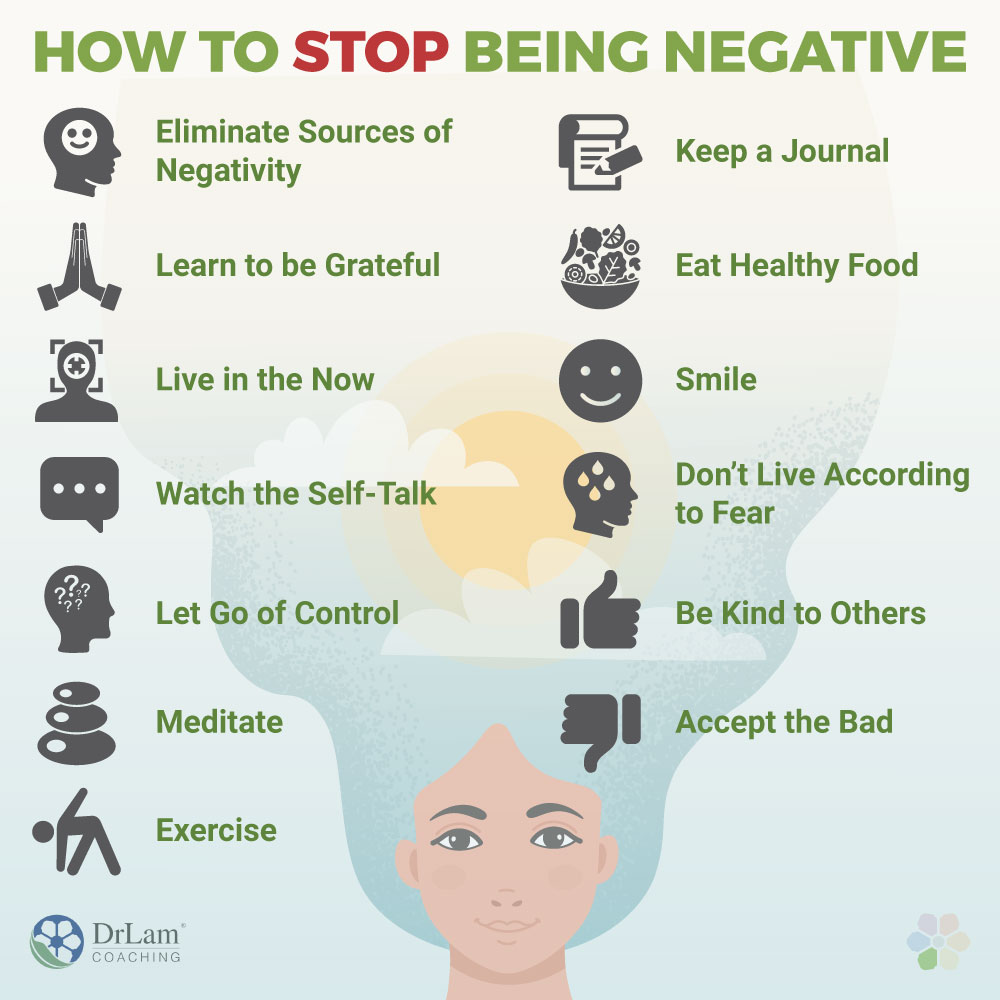 Thinking negatively is natural. The world can be a scary place, and our bodies are designed to focus on what is most like to be dangerous to us - the worst. While some people naturally tend to think positively, but this is often a deliberately cultivated trait. However, constant negativity can keep your body in a constant state of stress, eventually damaging your health and your life. That’s why it’s so important to catch yourself and learn how to stop being negative if you want to live a happier, healthier life.
Thinking negatively is natural. The world can be a scary place, and our bodies are designed to focus on what is most like to be dangerous to us - the worst. While some people naturally tend to think positively, but this is often a deliberately cultivated trait. However, constant negativity can keep your body in a constant state of stress, eventually damaging your health and your life. That’s why it’s so important to catch yourself and learn how to stop being negative if you want to live a happier, healthier life.
Negativity is a form of stress. When your brain focuses on negativity, you are essentially focusing on the worst-case scenario, the most dangerous thing in your environment. And your body responds like its life is in danger. It releases cortisol, the stress hormone, into your body to get ready for fight or flight, which eventually upsets the balance of your brain chemicals and hormones.
If you’re trying to learn how to stop being negative, then chances are that you feel a lot of negativity, and this can turn into chronic stress. Chronic stress can shorten your life and bring on conditions like high blood pressure, digestive disorders, adrenal fatigue, and chronic infections.
Chronic stress is closely connected to Adrenal Fatigue Syndrome (AFS). This occurs when your body’s ongoing demand for cortisol fatigues the adrenal glands, which produce this chemical. The adrenal glands are an essential part of the NeuroEndoMetabolic (NEM) Stress Response, the system your body uses to handle any kind of stress. So when the adrenals become fatigued, it will affect the balance and functioning of all the circuits in the NEM stress response. This can lead to chronic poor health as well as specific problems with individual circuits, including the Neuroaffect Circuit.
Protecting and restoring the balance and function of the Neuroaffect circuit is another reason to learn how to stop being negative. This circuit is comprised of the biological aspects of the brain, the autonomic nervous system (ANS), and the microbiome or bacterial balance in the body. These three components work together to help resolve stress and control a number of vital functions in the body. Issues like anxiety, depression, and phobias are also affected by this circuit.
Constant stress and negativity affect the health and functioning of each of these components. The balance of Neurotransmitters (NTs) in the brain is disrupted as the ANS becomes overactive and causes the release of higher than normal levels of epinephrine and norepinephrine. These are powerful chemicals that affect the health of the brain and trigger the fight or flight response and overexcitation throughout the body. When these NTs are overproduced, relaxing NTs like serotonin and dopamine decline, further impacting the brain.
Chronic negativity and the resulting stress also changes the balance of the microbiome, allowing bad bacteria to grow, disrupting your immune system and digestion. The bacterial balance in the gut in particular affects the health of the brain through the vagus nerve, causing additional stress and further imbalances.
This eventually impacts your mood, causing additional negativity. And this feedback loop is why it’s so important that you learn how to stop being negative, to protect your body and mind from needlessly high levels of stress.

There are many small mindset shifts and lifestyle changes to help learn how to stop being negative. Try one or all of these ideas and see what a difference it makes in your life:
 It isn’t just your brain that’s making you feel negative. It’s also things around you that are feeding you negativity. That’s why identifying and eliminating these sources is a vital part of learning how to stop being negative.
It isn’t just your brain that’s making you feel negative. It’s also things around you that are feeding you negativity. That’s why identifying and eliminating these sources is a vital part of learning how to stop being negative.
Look at your social media feeds, the news you watch, and the people around you. Are they consistently negative? Do you walk away from them feeling worse than you did before, every time? If the answer is yes, then it might be time to reduce or eliminate your exposure to them.
It’s easy to focus on the bad in your life, but that means that you ignore the good. Instead, make a practice every day of noticing the things you’re grateful for and being thankful they’re in your life. Studies actually show that writing a letter to someone you're grateful for and reading that letter to them can actually increase happiness for weeks!
Being negative is often a form of worry and anxiety. It’s focused on the past or the future. Derail it by focusing on the present. This is the only time that you have any control over, so focus on what’s happening right now and let it take your attention away from negative thoughts about the past or future.
When you’re learning how to stop being negative, you’ll probably find that you’re most negative about yourself. Everyone has that little voice inside their head, the one that tells them they aren’t good enough, pretty enough, or skilled enough. This will leave you feeling bad about yourself and will also affect the success you achieve in life.
This can be a hard habit to break, but you can start by focusing on the positive. Find something about yourself that you admire, whether it’s your strength, your kindness, or your ability to make others feel safe. And use that quality as a positive affirmation whenever you feel down. You can also focus on crafting positive affirmations that are the opposite of negative thoughts you often have, to act as a kind of antidote.
Learning what you can and can’t control is an important part of working out how to stop being negative. Human beings like to be in control because control brings safety. But in reality, there’s very little in life that you can control apart from yourself. So, the next time you get upset, ask yourself what you can control in the situation. And deliberately work on letting go of the things you can’t control while focusing on what you can.
 Meditation can be difficult, but it’s also a way to focus on the present and to lessen the control that your thoughts have over you. Try mindfulness meditation in particular, which will teach you to step back from your thoughts and your emotions and to observe without being affected. When practiced enough, this skill will transfer over into other parts of your life.
Meditation can be difficult, but it’s also a way to focus on the present and to lessen the control that your thoughts have over you. Try mindfulness meditation in particular, which will teach you to step back from your thoughts and your emotions and to observe without being affected. When practiced enough, this skill will transfer over into other parts of your life.
Regular exercise releases endorphins that make you feel good and improve your mood. So if you’re feeling negative, take the time for a short walk, yoga session, or any other exercise you enjoy. You will feel better for it afterward.
Be careful when you adopt this strategy when you have AFS, however, as strenuous exercise strains your adrenal glands and may worsen your symptoms, so opt for very gentle exercises instead, like gentle yoga or breathing exercises.
If you need to learn how to stop being negative, chances are that you ruminate over things endlessly - most people do. Try getting it out onto paper instead. This can help you see the problem more clearly and it can even help you find a solution.
Your gut is connected to your brain via the vagus nerve. So, if your gut is unhealthy because of sugary, highly processed food, it will affect the health and balance of your brain as well. The food you eat is also the source of the fuel that your brain needs to function properly, so make sure you’re giving your body all the nutrition it needs. Eating a healthy diet with plenty of fruits and vegetables, lean protein, healthy fats, and probiotics may help.
This strategy may also benefit your Neuroaffect circuit by improving the health and the balance of your gut and its microbiome.
Try smiling when you’re feeling negative, even if only for a moment. Studies show that smiling causes the release of serotonin and dopamine, both of which are NTs that will help you feel good.
Fear is natural, particularly when you’re trying new things. But if you let fear control you, it will ruin your life and make you feel negative. Pay attention when you feel afraid, as it might be a sign that something’s wrong. But don’t let fear stop you from trying new things or from living your life. Learn to identify when the fear is justified and when it’s based on unlikely events or concerns.
A big part of learning how to stop being negative involves focusing on yourself. But shifting the focus to others can also be helpful. So, turn your focus outwards. Give a compliment to a stranger, help a friend, or volunteer some time to make someone else’s life better. It will definitely make you feel happier and more at peace with the world.
Having negative feelings isn’t a bad thing and denying them will only force them under the surface; it won’t eliminate them. It’s natural to feel bad when you get terrible news, have a fight with a friend, or fail at something you’ve worked towards. Don’t try to fight these feelings. Feel them, accept them, and work with them. You’ll be stronger and healthier in the long run.
Whatever you do, don't scold yourself or think worse of yourself for thinking negatively. This type of thinking is natural and punishing yourself only makes you feel worse. Instead, work on learning how to stop being negative and integrating these ideas into your lifestyle:
 Get your negative emotions out by journaling or finding other ways to express them.
Get your negative emotions out by journaling or finding other ways to express them.If you’re struggling with constant negativity and its effects on your body and mind, get help and support from our team on +1 (626) 571-1234 or click here.
Obviously, there will always be hard times in your life during which you will feel consistently negative. However, thinking this way doesn’t help you in any way and may harm your body. By learning how to stop being negative, you will make yourself stronger and healthier overall.
